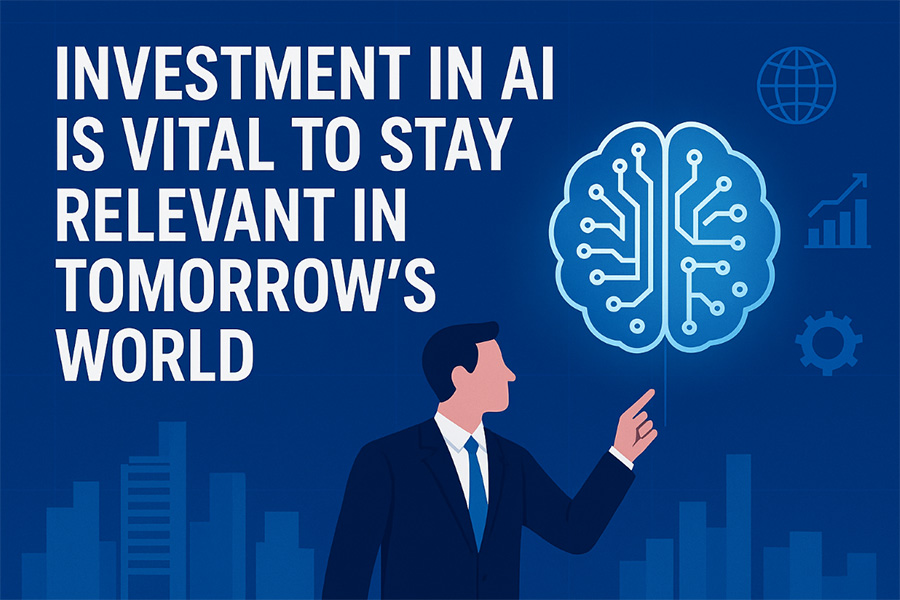Artificial Intelligence (AI) is no longer just a buzzword or a futuristic concept. It is the backbone of the next industrial revolution, shaping economies, redefining industries, and transforming the way individuals and businesses operate. As organizations and nations prepare for the challenges of tomorrow, investment in AI is not merely an option, it is a necessity to stay competitive, relevant, and future-ready.
The world is moving rapidly toward AI-driven ecosystems. From self-driving cars to personalized healthcare, from predictive financial models to smart cities, AI is becoming deeply integrated into the fabric of everyday life. According to recent market research, global AI spending is projected to reach hundreds of billions of dollars within the next decade. Governments and corporations alike are racing to harness AI’s potential, knowing that the ones who lead this transformation will hold the keys to future growth.
According to Sharad Agarwal, Founder of ‘The Bule Whale AI Academy’ “For businesses, failing to adopt AI means falling behind competitors who can operate more efficiently, innovate faster, and respond to market shifts with greater agility.Those who act decisively today will not only stay relevant but will lead the transformation of tomorrow’s world. Those who hesitate risk being left behind in a rapidly evolving global landscape.”
Why Investment in AI Matters
Driving Innovation and Efficiency
AI has the power to automate repetitive processes, reduce operational costs, and improve accuracy across industries. For example, in manufacturing, AI-driven robotics can streamline production lines, while in logistics, AI optimizes supply chains, reducing delays and costs. Investing in AI allows businesses to reallocate human talent to more creative, strategic roles, thereby boosting innovation.
Enhancing Customer Experience
Today’s consumers demand speed, personalization, and convenience. AI-powered tools like chatbots, recommendation engines, and predictive analytics provide businesses with the ability to deliver tailored experiences. This not only improves customer satisfaction but also increases brand loyalty and revenue. Companies investing in AI-driven customer engagement are already seeing exponential returns.
Future-Proofing Businesses
Technological disruptions have historically reshaped industries—from the steam engine to the internet. AI represents the next seismic shift. Businesses that fail to invest now risk being left behind, much like companies that ignored the digital revolution two decades ago. AI is not just a tool; it is becoming the foundation of future business models.
Global Competitiveness
AI investment is also about survival on a global scale. Nations that integrate AI into their economies will dominate industries ranging from healthcare and education to defense and finance. For businesses, global competitiveness increasingly depends on the ability to leverage AI-driven insights to expand into new markets and maintain an edge over international rivals.
The Impact Across Industries
AI is not confined to one sector; its influence is universal:
Healthcare: AI is revolutionizing diagnostics, drug discovery, and patient care. From early cancer detection to robotic surgeries, investment in AI is improving outcomes while reducing costs.
Finance: AI algorithms are being used to detect fraud, manage investments, and enhance financial forecasting. This makes financial systems more secure and efficient.
Retail: Predictive analytics helps retailers anticipate consumer demand, optimize inventory, and design personalized shopping experiences.
Education: AI-driven learning platforms are tailoring education to individual needs, making lifelong learning more accessible and effective.
Sustainability: AI plays a key role in energy optimization, climate modeling, and smart agriculture, helping societies address global challenges like climate change and food security.
The Risks of Ignoring AI
Failure to invest in AI carries significant risks. Businesses that delay adoption may face declining market share, reduced profitability, and an inability to attract top talent. Moreover, without AI integration, organizations may struggle to meet the evolving expectations of digitally savvy customers.
At the national level, lack of AI investment could result in economic stagnation, dependence on foreign technology, and reduced geopolitical influence. Just as countries that failed to industrialize in the past were left behind, those that neglect AI now risk being marginalized in the global economy.
Balancing Opportunity with Responsibility
While the potential of AI is immense, investment must be paired with responsibility. Concerns around data privacy, job displacement, and algorithmic bias are real and must be addressed through ethical frameworks and regulations. Businesses and governments investing in AI should ensure that innovation aligns with human values and inclusivity. This balance between opportunity and responsibility will define the long-term success of AI adoption.
In tomorrow’s world, relevance will be determined not by tradition, but by innovation. AI is no longer a luxury investment for elite corporations—it is a foundational necessity for survival and growth. Whether for businesses striving to remain competitive, governments aiming for economic leadership, or societies seeking sustainable solutions, investment in AI is the bridge to the future.





